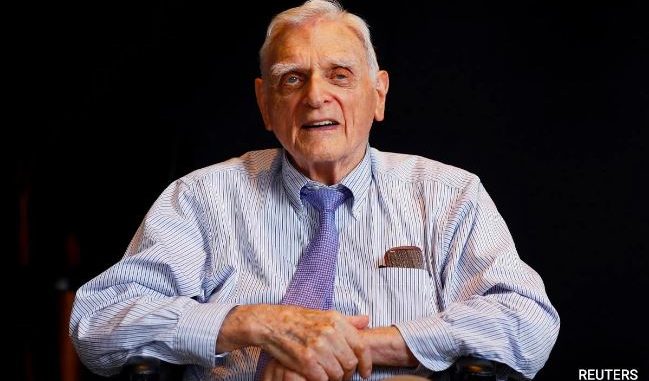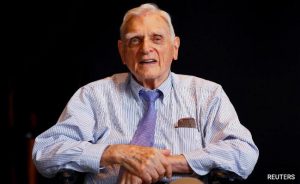
Battery Pioneer and Nobel Prize Winner John Goodenough Passes Away at 100.
- Renowned Scientist’s Invention of the Lithium-Ion Battery Revolutionized Modern Life.

John Goodenough, the esteemed scientist and recipient of the 2019 Nobel Prize in Chemistry for his groundbreaking work on the development of the lithium-ion battery, has passed away at the age of 100, as announced by the University of Texas.
Mr. Goodenough’s contributions to the field paved the way for transformative technologies such as smartphones and contributed to the pursuit of a fossil fuel-free society.
Jay Hartzell, President of the University of Texas at Austin, expressed his condolences and highlighted Goodenough’s remarkable legacy, stating, “John’s legacy as a brilliant scientist is immeasurable. His discoveries improved the lives of billions of people around the world. He was a leader at the cutting edge of scientific research throughout the many decades of his career.”
In 1986, at the age of 64, Goodenough joined the University of Texas as a faculty member in the Cockrell School of Engineering, where he dedicated 37 years to teaching and research. Sharon Wood, Provost of the University of Texas, described him as an incredible mind and generous spirit, underscoring his lasting impact on the scientific and engineering community.
Goodenough made history by becoming the oldest person to receive a Nobel Prize at the age of 97. In 2019, he shared the prestigious chemistry award with Stanley Whittingham of the UK and Akira Yoshino of Japan for their groundbreaking invention of the lithium-ion battery. Their collaborative efforts led to the creation of a stable, powerful, and rechargeable battery that revolutionized various industries.
Whittingham’s initial discovery in the 1970s utilized the potential energy in lithium but faced stability issues. Goodenough built upon this foundation, enhancing the battery’s potential energy and making it more viable. Finally, Yoshino’s use of a carbon-based material in 1985 rendered the battery commercially feasible, leading to its widespread adoption.
The lithium-ion battery has had a profound impact on human mobility, enabling access to information and services worldwide through mobile phones. Furthermore, these batteries have significantly reduced reliance on fossil fuels, particularly in the context of electric vehicles, thereby mitigating the effects of climate change.
In response to receiving the Nobel Prize, Goodenough expressed his satisfaction with the global impact of his work, emphasizing the importance of using scientific discoveries for the greater good. He stated, “We need to build relationships, not wars. I am happy if people use this for good, not evil.”
John Goodenough was born in 1922 in Germany and later moved to the United States. He obtained a bachelor’s degree in mathematics from Yale University and served as a meteorologist in the US Army during World War II. He went on to earn a master’s degree and a Ph.D. in physics from the University of Chicago in 1952. Throughout his career, Goodenough made significant contributions to various institutions, including the Massachusetts Institute of Technology and Oxford University.
His intellectual curiosity and dedication to scientific advancements were evident even in his later years, as he continued to work well into his 90s. Goodenough leaves behind a lasting legacy that will inspire future generations of innovators and researchers.
